 PHOTO: Mary van Balen Today’s Old Testament reading is from Isaiah. We will hear much from Isaiah this advent season, and today’s passage (11.1-10) is an example of his confidence in God’s goodness and wonder at Divine glory. From the concrete image of a shoot sprouting from a stump, the prophet moves us to the infusion of the Spirit that will fill the One who comes. He will possess wisdom and will seek justice for the poor.
PHOTO: Mary van Balen Today’s Old Testament reading is from Isaiah. We will hear much from Isaiah this advent season, and today’s passage (11.1-10) is an example of his confidence in God’s goodness and wonder at Divine glory. From the concrete image of a shoot sprouting from a stump, the prophet moves us to the infusion of the Spirit that will fill the One who comes. He will possess wisdom and will seek justice for the poor.
His kingdom is like no other, filled with glorious impossibilities:the wolf the guest of the lamb, the calf and young lion exploring together, the lion eating hay, a child playing in the cobra’s den.
If all these probable impossibilities are to come, is nothing impossible? All people living in peace? No wars? No hunger or famine? No abuse?
This morning, I want to believe, but my heart does not resonate with the joy of the verses. I look at my Christmas Cactus, ready to bloom in the midst of gray, rainy winter. Its magenta buds add a splash of color to the room, but I struggle to savor it.
“It is in the will, not the heart,” a friend of mine once said when we were both struggling with a dry spell of spirit. I remember her words today and choose to believe. I moved my plant to sit next to the advent “wreath,” both signs of promise and hope in its fulfillment. I sit in God’s Presence for a while, both of us comfortable with my silence; me not so comfortable with God’s. We rest together, and then I move into the rest of the day, choosing hope.
 PHOTO: Mary van Balen This year my advent wreath is simple: blue candles in two glass candelabra from my parent’s home. I will add a few things as I unpack a holiday box, but simplicity remains the theme.. The old candelabra remind me of my parents’ waiting in hope for the birth of each of their children. I arrived after a number of miscarriages. The youngest was an emergency delivery and my father was told that likely neither mother or child would survive. They didn’t know my mother’s sheer willpower, and my brother inherited her tenacity. Both survived.
PHOTO: Mary van Balen This year my advent wreath is simple: blue candles in two glass candelabra from my parent’s home. I will add a few things as I unpack a holiday box, but simplicity remains the theme.. The old candelabra remind me of my parents’ waiting in hope for the birth of each of their children. I arrived after a number of miscarriages. The youngest was an emergency delivery and my father was told that likely neither mother or child would survive. They didn’t know my mother’s sheer willpower, and my brother inherited her tenacity. Both survived.  PHOTO: Mary van Balen My day off. No alarm set. Still, I rose early, before much light filtered through the blinds. I slipped into some comfortable clothes, feeling for their familiar fabric rather than turning on lights that would shatter the calm of darkness. Jeans, I knew, hung over the back of the chair by my bed. A cotton T. A sueded jacket to ward off chill.
PHOTO: Mary van Balen My day off. No alarm set. Still, I rose early, before much light filtered through the blinds. I slipped into some comfortable clothes, feeling for their familiar fabric rather than turning on lights that would shatter the calm of darkness. Jeans, I knew, hung over the back of the chair by my bed. A cotton T. A sueded jacket to ward off chill. CONSTELLATION ORION Four saints are mentioned for remembrance today on
CONSTELLATION ORION Four saints are mentioned for remembrance today on 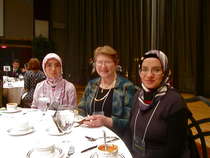
 A friend invited me to attend the
A friend invited me to attend the 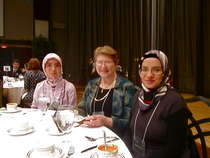 I encourage you to visit the websites of these two organizations. You may be surprised at the variety of opportunities these nonprofit groups offer to all: luncheons, lectures, interfaith dinners, morning conversations, community service. And the opportunity to develop friendships that span the globe, sharing what is most basic to all human beings: family, faith, community, and the common good. The way to peace is made with small steps. It is made through person to person interaction and service.
I encourage you to visit the websites of these two organizations. You may be surprised at the variety of opportunities these nonprofit groups offer to all: luncheons, lectures, interfaith dinners, morning conversations, community service. And the opportunity to develop friendships that span the globe, sharing what is most basic to all human beings: family, faith, community, and the common good. The way to peace is made with small steps. It is made through person to person interaction and service.  PHOTO: Mary van Balen PICASSO PLATE – GIFT FROM WOMAN ACTIVE IN THE FRENCH PEACE MOVEMENT The Scripture reading from Morning Prayer today (Proverbs 8. , 32-36) as well as the OT reading from Mass (Ws 7. 22b-8.1) speak of the importance of seeking Wisdom and Understanding: “Happy are those who keep my ways. Listen to instruction and grow wise…Happy the one who listens to me, attending daily at my gates, keeping watch at my doorstep.”
PHOTO: Mary van Balen PICASSO PLATE – GIFT FROM WOMAN ACTIVE IN THE FRENCH PEACE MOVEMENT The Scripture reading from Morning Prayer today (Proverbs 8. , 32-36) as well as the OT reading from Mass (Ws 7. 22b-8.1) speak of the importance of seeking Wisdom and Understanding: “Happy are those who keep my ways. Listen to instruction and grow wise…Happy the one who listens to me, attending daily at my gates, keeping watch at my doorstep.”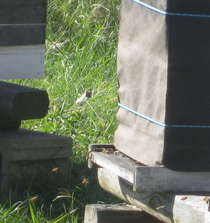
 PHOTO: Mary van Balen I took advantage of a day off to accomplish a number of things: doctor appointment, hair cut, and repotting plants. The day was too beautiful not to spend some of it outside and my hospitable friend, Melanie happily offered her time and her place. We have walked paths that wind across her property in every season. We have watched for comets and stars in dark hours of the morning. As I drove to her home, I felt my spirit become lighter anticipating a shared few hours.
PHOTO: Mary van Balen I took advantage of a day off to accomplish a number of things: doctor appointment, hair cut, and repotting plants. The day was too beautiful not to spend some of it outside and my hospitable friend, Melanie happily offered her time and her place. We have walked paths that wind across her property in every season. We have watched for comets and stars in dark hours of the morning. As I drove to her home, I felt my spirit become lighter anticipating a shared few hours.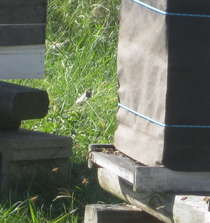 Melanie and I walked around the pond and circled by the bee hives. The man who cares for them had winterized them, but bees were busily flying in and out. In November. That seems late to me, but I am not a bee keeper. We watched for a while, and when after a simple lunch, when I left for my appointments, I stopped in the drive long enough to watch the bees again and take a few photos. Buzzing became louder, and when a bee landed on my hand, I decided the time had come to leave.
Melanie and I walked around the pond and circled by the bee hives. The man who cares for them had winterized them, but bees were busily flying in and out. In November. That seems late to me, but I am not a bee keeper. We watched for a while, and when after a simple lunch, when I left for my appointments, I stopped in the drive long enough to watch the bees again and take a few photos. Buzzing became louder, and when a bee landed on my hand, I decided the time had come to leave.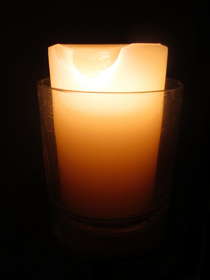 From the Exultet:
From the Exultet: All Saints Day II by Kadinsky The short reading for today’s
All Saints Day II by Kadinsky The short reading for today’s  PHOTO: Mary van Balen The morning after Halloween, my mom’s large, silver mixing bowl filled with small candy bars sits on my table, tempting me. Why not have a bit of sweet to start the morning. I had feared this would happen. Being new to the neighborhood, I had no idea if trick or treaters would find their way to my door, so I prepared with a few bags of candy bars. When my neighbor appeared outside in the afternoon ready to take a walk, I asked her about Halloween “traffic.”
PHOTO: Mary van Balen The morning after Halloween, my mom’s large, silver mixing bowl filled with small candy bars sits on my table, tempting me. Why not have a bit of sweet to start the morning. I had feared this would happen. Being new to the neighborhood, I had no idea if trick or treaters would find their way to my door, so I prepared with a few bags of candy bars. When my neighbor appeared outside in the afternoon ready to take a walk, I asked her about Halloween “traffic.” 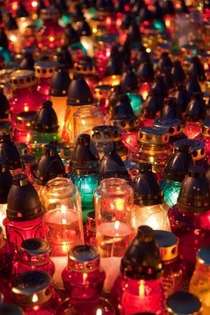

 All Souls Day, a day of prayer for those who have died but are not yet purified of the result of their sins, is commemorated on Nov. 2 in the Roman Catholic church. Those still waiting to be in the presence of God, the “beatific vision,” are those in need of prayer. In some countries, people visit cemeteries and decorate them with flowers and candles on Nov. 1 and 2.
All Souls Day, a day of prayer for those who have died but are not yet purified of the result of their sins, is commemorated on Nov. 2 in the Roman Catholic church. Those still waiting to be in the presence of God, the “beatific vision,” are those in need of prayer. In some countries, people visit cemeteries and decorate them with flowers and candles on Nov. 1 and 2.